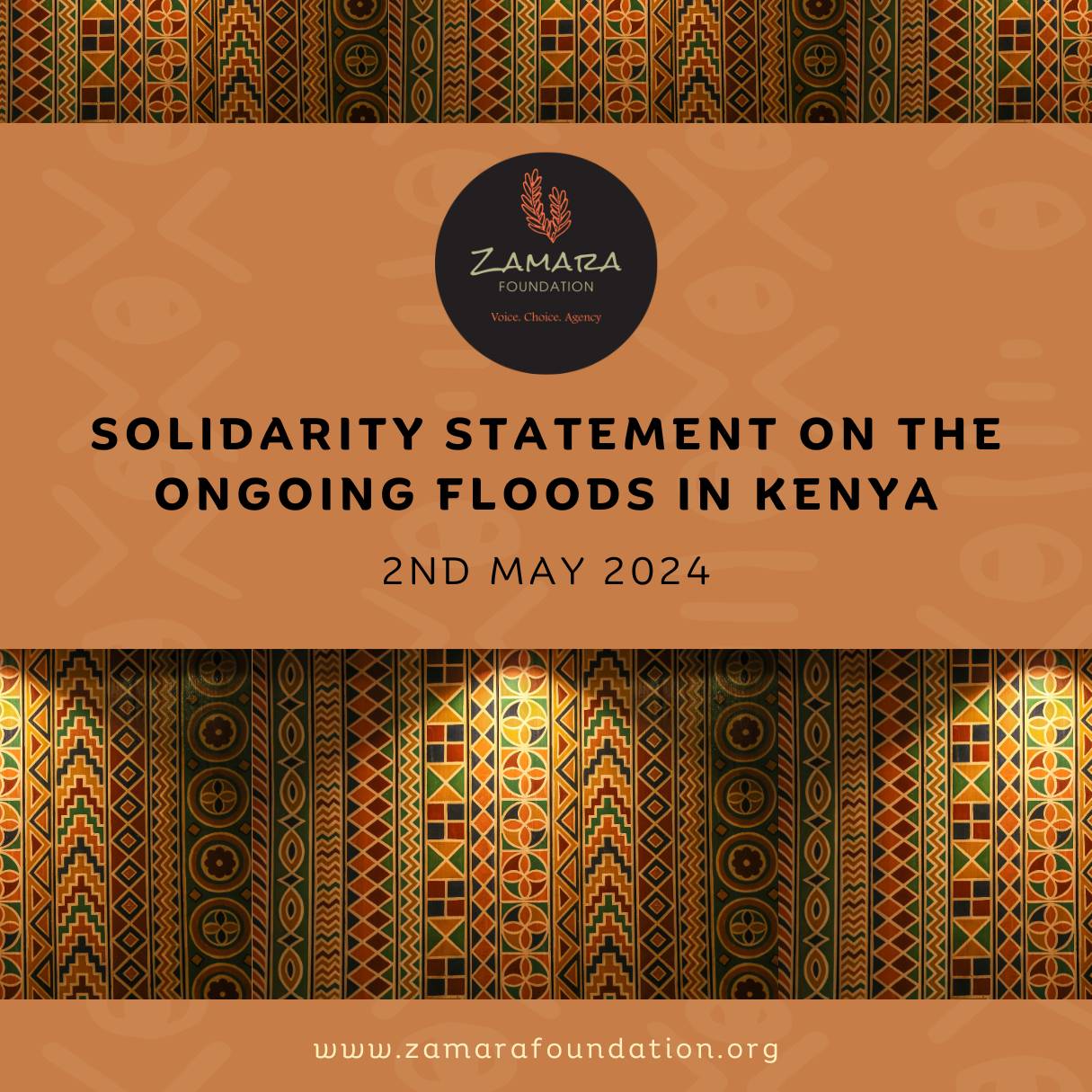
Solidarity statement on the ongoing floods in Kenya
As a feminist organization deeply rooted in the struggle for gender equality and social justice, we extend our heartfelt solidarity to all affected directly and indirectly by the devastating floods sweeping Kenya. In times of crisis, we must unite in solidarity, recognizing the interconnectedness of our struggles and the importance of supporting one another, particularly those most vulnerable.
The impact of these floods is far-reaching, touching the lives of countless individuals and communities nationwide. We stand in solidarity with those who have lost their homes, their livelihoods, and their loved ones. We recognize the disproportionate impact of natural disasters on women and girls in all their diversities, who often bear the brunt of the crisis, facing increased risks of violence, displacement, and economic insecurity. Other compounded challenges include disrupted access to clean water, sanitation facilities, and healthcare services, which disproportionately impact their well-being, placing them at greater risk of illness and injury.
Feminist solidarity requires prioritising the experiences and voices of those most marginalised and impacted by the floods in the face of hardship. We commit to ensuring the voices of women, especially those from underrepresented groups, who lead response and recovery initiatives and exhibit fortitude, bravery, and leadership in the face of enormous obstacles are heard. We applaud all the women human rights defenders at the forefront of responding to this crisis.
We recognize and acknowledge that climate change’s impacts exacerbate existing inequalities and injustices, disproportionately affecting women and girls in all their diversities and marginalized communities. Climate justice is intrinsically linked to gender justice, and we call for intersectional approaches to addressing the root causes of environmental degradation and building resilient communities that prioritize the needs and rights of all people first. As feminists, we reject the narrative of helplessness and victimhood that often accompanies discussions of natural disasters. Instead, we advocate for collective action and solidarity-based approaches that prioritize community-led responses, centering the agency and leadership of women and marginalized groups in decision-making processes.
Like many other nations, Kenya has committed to gender equality and climate justice through various legislative and policy frameworks. The Kenyan Constitution guarantees equal rights and opportunities for all citizens, regardless of gender, and emphasizes the importance of gender mainstreaming in all sectors of society. International agreements such as the Paris Agreement and the Sendai Framework for Disaster Risk Reduction recognize the intersectionality of gender, climate change, and disaster risk, calling for gender-responsive approaches to climate adaptation and disaster management.
To truly address the intersecting challenges of climate change, gender inequality, and inadequate infrastructure, we must adopt a feminist approach to flood response and recovery efforts. This entails centering the voices and experiences of women in all their diversities in decision-making processes, ensuring their meaningful participation in all stages of disaster planning, response, and recovery. It also requires investment in gender-sensitive infrastructure, such as resilient housing, accessible healthcare facilities, and inclusive urban planning, prioritising women’s and marginalised communities’ safety and well-being.
As feminists committed to climate justice and social equity, we call upon the Kenyan government and relevant stakeholders to:
- We call on governments, policymakers, and humanitarian actors to adopt feminist approaches to disaster response and recovery, ensuring that the needs and rights of women and girls in all their diversities and marginalized groups are at the forefront of efforts to rebuild and restore affected communities. This includes providing access to essential services such as healthcare, sanitation, and education and addressing the root causes of vulnerability, including poverty, inequality, and discrimination.
- Prioritize gender-responsive flood response and recovery efforts, ensuring that women’s specific needs and priorities are integrated into all planning and implementation stages.
- Invest in resilient infrastructure and urban planning that addresses the gendered impacts of climate change and disasters, including protecting women’s rights to land and property ownership.
- Ensure the meaningful participation of women, especially those from marginalized communities, in decision-making processes related to climate adaptation, disaster risk reduction, and sustainable development.
In solidarity with all those affected by the floods in Kenya, we acknowledge that our challenges are intertwined and that our combined power rests in our cohesion. We reaffirm our commitment to building a more just, equitable, environmentally friendly and resilient world for women in all their diversities and future generations.
Download full statement HERE
